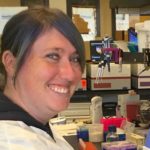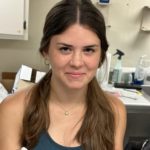Dr. Candace Mathiason is an professor of pathobiology, associate department head for research in the Department of Microbiology, Immunology, and Pathology, director of the Infectious Disease and Rapid Response Network, a Program for Research and Scholarly Excellence designated by the Office of the Vice President for Research; and co-founder/director of the Women in Science Network.
Dr. Mathiason’s research focuses on the role blood and maternal infections play in disease pathogenesis and transmission dynamics. Her laboratory combines use of native and rodent in vivo hosts with highly sensitive in vitro assays to assimilate an understanding of the biological mechanisms associated with covert transmission of infectious agents. The intent of these works is to provide basic science principles for continued efforts to mitigate infectious agents via preventative, therapeutic and vaccine therapies.
Tied closely to the successes her laboratory has enjoyed is the pursuit of strategies to improve science communication and efforts to impact the role of women in science. The goal of this work is to improve and support the diversity of voices present in STEAM leadership roles.
research project
Detection and Characterization of Blood-borne Prions
No practical noninvasive antemortem test exists to detect cervid, human, or any prion disease. We have developed simple, rapid, specific and highly sensitive in vitro assays to detect blood-borne prions. Combining these assays with innovative tools developed by collaborators, we are quantitating the temporal distribution and specific blood cell phenotypes critical to human and cervid prionemia.
research project
Chronic Wasting Disease Vaccines
No prophylactic or therapeutic regimen is known for any prion disease. With our collaborators, we have developed novel vaccine strategies, a carefully graded chronic wasting disease challenge, and a longitudinal monitoring system using ultrasensitive chronic wasting disease detection methods in white-tailed deer permitting vaccine assessment in the native host.
research project
Mechanisms of prion spread and establishment of infection
Prion diseases are inevitably fatal neurodegenerative disorders with no known treatment or cure. Little is known about the site(s) of initial establishment of infection, clearance of inoculum, and whether replication of agent is required for neuroinvasion. The long-term goal of these studies is to identify the sites of initial prion replication and to identify new routes of neuroinvasion.
research project
Cross-scale dynamics of multi-host vector-borne pathogens at the wildlife-domestic interface in ruminant communities
Our study system is uniquely valuable for investigating the dynamics between invertebrate (midges) and vertebrate (wild and domestic ruminant) hosts across regions with wide ecological gradients to assess the roles of each in the emergence of pervasive genetic viral variants.
research project
Exploring the potential for in utero transmission of chronic wasting disease prions in white-tailed deer
The presence of prion deposition has been identified in the reproductive tissues and milieu of several cervid species. Our ongoing studies are aimed to determine the biological relevance of this deposition in maternal, paternal and fetal tissues of free-range cervids naturally exposed to chronic wasting disease.
Publications
Chronic Wasting Disease: State of the Science.
Bartz JC, Benavente R, Caughey B, Christensen S, Herbst A, Hoover EA, Mathiason CK, McKenzie D, Morales R, Schwabenlander MD, Walsh DP, The Nc North American Interdisciplinary Chronic Wasting Disease Research Consortium Members.Pathogens. 2024 Feb 2;13(2):138. doi: 10.3390/pathogens13020138.PMID: 38392876
Expression of the cellular prion protein by mast cells in the human carotid body.
Sweetland GD, Eggleston C, Bartz JC, Mathiason CK, Kincaid AE.Prion. 2023 Dec;17(1):67-74. doi: 10.1080/19336896.2023.2193128. PMID: 36943020
Monitoring longitudinal immunological responses to bluetongue virus 17 in experimentally infected sheep.
Westrich JA, McNulty EE, Carpenter M, Burton M, Reed K, Nalls A, Sandoval A, Mayo C, Mathiason CK. Virus Res. 2023 Dec;338:199246. doi: 10.1016/j.virusres.2023.199246. Epub 2023 Oct 19. PMID: 37858729
Genetic modulation of CWD prion propagation in cervid PrP Drosophila.
Thackray AM, McNulty EE, Nalls AV, Cardova A, Tran L, Telling G, Benestad SL, Gilch S, Mathiason CK, Bujdoso R. Biochem J. 2023 Oct 11;480(19):1485-1501. doi: 10.1042/BCJ20230247. PMID: 37747806
Large animal models for chronic wasting disease.
Mathiason CK.Cell Tissue Res. 2023 Apr;392(1):21-31. doi: 10.1007/s00441-022-03590-4. Epub 2022 Feb 3.PMID: 35113219
more publications
People
Candace Mathiason, Ph.D.
Lab Principal Investigator [PI]
Associate Department Head for Research
Director, Infectious Disease Research & Response Network
Professor
Jesse Cole
Graduate Research Assistant
D.V.M./Ph.D. T32 Scholar
Lydia Krob
Summer High School Intern
contact information
Office: Pathology room 229
Lab: Pathology rooms 223A, 225
(970) 491-3975
[email protected]














